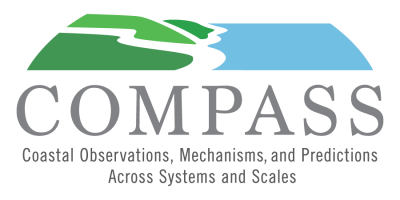EESM's COMPASS Project Focuses on Coastal Systems
Coastal regions today are facing a wide array of challenges, ranging from extreme weather events, ecosystem transitions, shoreline change, and other stressors with implications for people, infrastructure, and economies, including energy and water supplies, transportation, land and resource development, and community health. A new research program, sponsored by DOE’s Earth and Environmental System Modeling (EESM) program, is designed to enhance the predictive understanding of coastal systems, including their response to short- and long-term changes.
The Coastal Observations, Mechanisms, and Predictions Across Systems and Scales (COMPASS) project, which kicked off in early 2020, is a $20 million, two-year multi-institutional initiative comprised of two distinct yet closely coordinated pilot studies: the Great Lakes Modeling (GLM) pilot study and the Field Measurement and Experiments (FME) pilot study. COMPASS-GLM is managed by the EESM program, while COMPASS-FME is managed by Environmental System Science (ESS) program.
Modeling Contrasting Regions
The Great Lakes region of the United States is currently facing the ongoing challenges of shoreline change. A region dominated by ice and snow cover during winter, the Great Lakes region provides a unique opportunity for contrast with the Mid-Atlantic region of the United States, the area of focus for the FME pilot study.
The GLM pilot study led by Principal Investigator Rob Hetland of Pacific Northwest National Laboratory (PNNL) features watershed-scale modeling in Western Lake Erie and regional-scale modeling of the interactions such as heat and moisture exchange between the atmosphere and the Great Lakes. With a goal of better understanding how specific watershed processes and features affect nutrient removal and transport, GLM aims to address how precipitation, runoff, and air temperature interact with water balance, thermal structure, and circulation within the Great Lakes region both now and in the future. Building and extending from this work, the project will explore dynamics of urban heat island, with an initial focus in the Chicago metropolitan area.
Collaboration Among Coastal Studies
Centered in the Mid-Atlantic, the FME study aims to develop the measurements needed to better understand reactions that occur as this coastal ecosystem changes. Led by Principal Investigator Vanessa Bailey of PNNL, this work concentrates on the Chesapeake Bay region.
FME will also include coordination with another ongoing EESM Mid-Atlantic project, Integrated Coastal Modeling (ICoM). ICoM was launched in 2019 and is focused on bringing multiple modeling tools together to study the complex interactions among coastal systems. With support from the ICoM project, FME’s long-term goal is to understand how change affects coastal ecosystem processes. Scientists will apply the study’s findings to other coastal regions.
About COMPASS
COMPASS is a collaborative effort between PNNL, Argonne National Laboratory, Lawrence Berkeley National Laboratory, Los Alamos National Laboratory, and Oak Ridge National Laboratory, along with the Smithsonian Environmental Research Center, The University of Toledo, and Michigan Technological University. It aims to address the critical knowledge gaps that exist in our current understanding of coastal system processes. Researchers in both the FME and GLM pilot studies will draw on their existing expertise in addressing complex integrated human-earth system dynamics in their efforts to work towards COMPASS’ vision of dramatically enhancing the predictive understanding of coastal systems.

